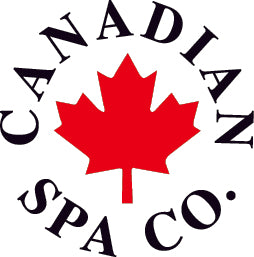You’ve decided to make the jump and purchase a spa – congratulations! To ensure you always have a clean tub, clear water, and are doing your part to conserve the longevity of the spa, maintaining your spa chemistry is important. Don’t worry – you won’t need your high school chemistry notes. However, you will need sanitizer.
We recommend you use chlorine granules and advise against other common sanitizers like minerals, salt water treatments, and chlorine tablets. The following will go over why.
MINERALS
 Mineral spa sanitizers can come in many different forms like mineral sticks, floating dispensers, or inline systems. The most commonly used elements are silver and copper. Silver is known for its antibacterial properties, and copper works well against algae. (Image Source: Amazon) <spa, spa chemicals, hot tub, swim spa, soft tub, portable spa, canadian> <spa, spa chemicals, hot tub, swim spa, soft tub, portable spa, canadian>  While they are technically sanitizers, mineral sanitizers are not strong enough on their own. Mineral sanitizers need be used in combination with chemical sanitizers like chlorine to ensure your spa is fully sanitized. As well, since copper oxidizes, it can stain your spa and cause the water to go green. The only reason your water should be green is because it's lit up by your LED lights. Mineral levels are also difficult to measure as they cannot be measured on most test strips. (Image Source: Reddit) While they are technically sanitizers, mineral sanitizers are not strong enough on their own. Mineral sanitizers need be used in combination with chemical sanitizers like chlorine to ensure your spa is fully sanitized. As well, since copper oxidizes, it can stain your spa and cause the water to go green. The only reason your water should be green is because it's lit up by your LED lights. Mineral levels are also difficult to measure as they cannot be measured on most test strips. (Image Source: Reddit) |
*Since minerals are not providing adequate sanitization, they may void your warranty.
SALT WATER

Salt water sanitization systems have also become increasingly popular. With that being said, there is a common misconception that salt water is a chlorine-free sanitization process. Salt is sodium chloride (NaCl). In a process called electrolysis done by a sodium chloride generator, salt water passes through an electric current creating chlorine to sanitize your spa.
The problem with using salt water is that salt is corrosive to the spa’s internal components. This may lead to unnecessary maintenance you would not have to do otherwise, like switching out internal pipes.
*The use of salt water can void your warranty as it damages spas’ components.
CHLORINE TABLETS

Chlorine is commonly used as a spa sanitizer due to its low cost and effectiveness. Specifically, chlorine tablets are highly concentrated forms of chlorine (trichlor) and they work by slowly dissolving into your spa water after being placed in a dispenser. While they may seem convenient, there are downsides to tablets and we recommend chlorine granules instead.
To begin with, since chlorine tablets have a set amount of chlorine, you cannot adjust them according to your spa’s water levels. If too much is added, you will have to drain some water out of your spa and add water back in to dilute it. The slow and inconsistent release of chlorine also makes it harder to measure pH and chemical levels over time, giving you less control overall.
Additionally, people treat chlorine tablets as a one-and-done solution when they are not. Trichlor can make the pH and alkalinity levels of your spa water go down, which means your water becomes acidic (your spa water should be neutral). If your spa water is not being balanced regularly and you have overchlorinated your hot tub, the acidity will irritate your skin and eyes while in the spa. High acidity is not good for your skin, nor the components in your spa such as the pillows, heater, pump etc.
*If the issues with your spa are deemed to be a result of chemical damage, your warranty may be voided.
THE WINNER: CHLORINE GRANULES

Chlorine granules are our recommended sanitizer. We use dichlor granules, which are less concentrated forms of chlorine. There are a number of reasons chlorine granules are the better choice for your spa sanitization.
To start, chlorine granules are easy to measure and control. You can customize exactly how much chlorine you are adding to your spa based on the spa’s water capacity and chemical levels.
Dichlor granules are also relatively neutral which is what you want your spa water to be. Compared to tablets, there is a smaller chance of over chlorinating your water, which means granules are less likely to cause damage to your spa’s components or irritate your skin. Additionally, chlorine granules dissolve quickly inside your hot tub instead of being dispensed over time, working against bacteria faster.
If you do not want to use chlorine, bromine is safe to use in our spas. However, since bromine will affect your pH levels, you will need to use much more to get equally as effective sanitization.
Have more questions? Contact us at service@canadianspacompany.com or 1-877-909-7727.

